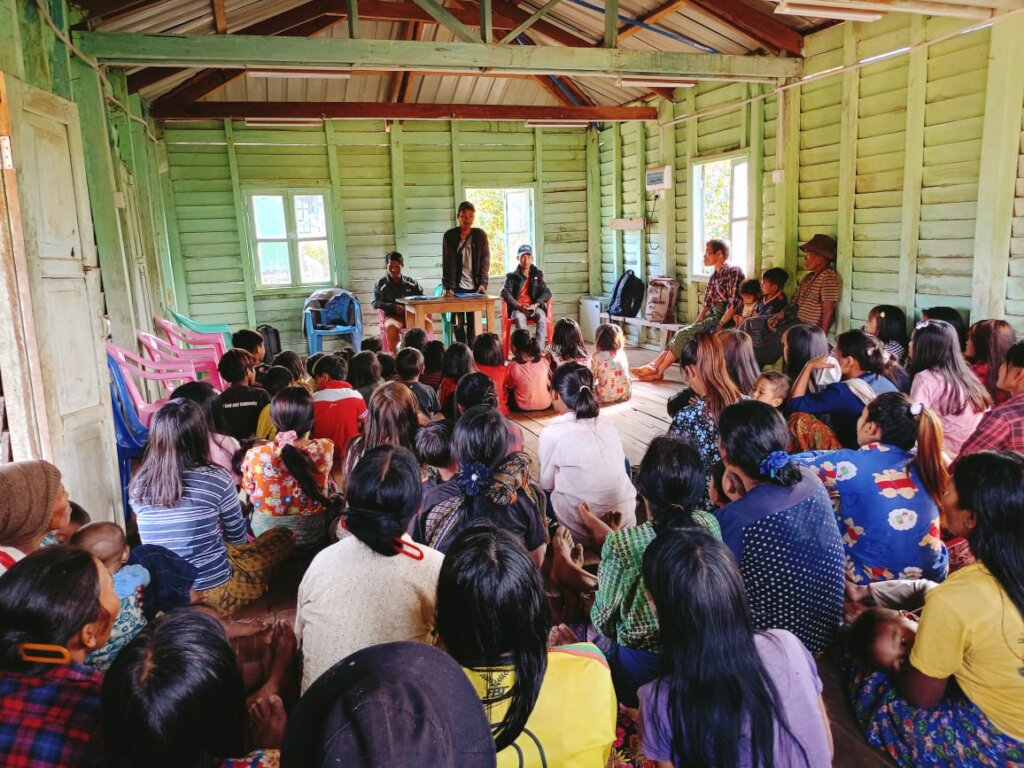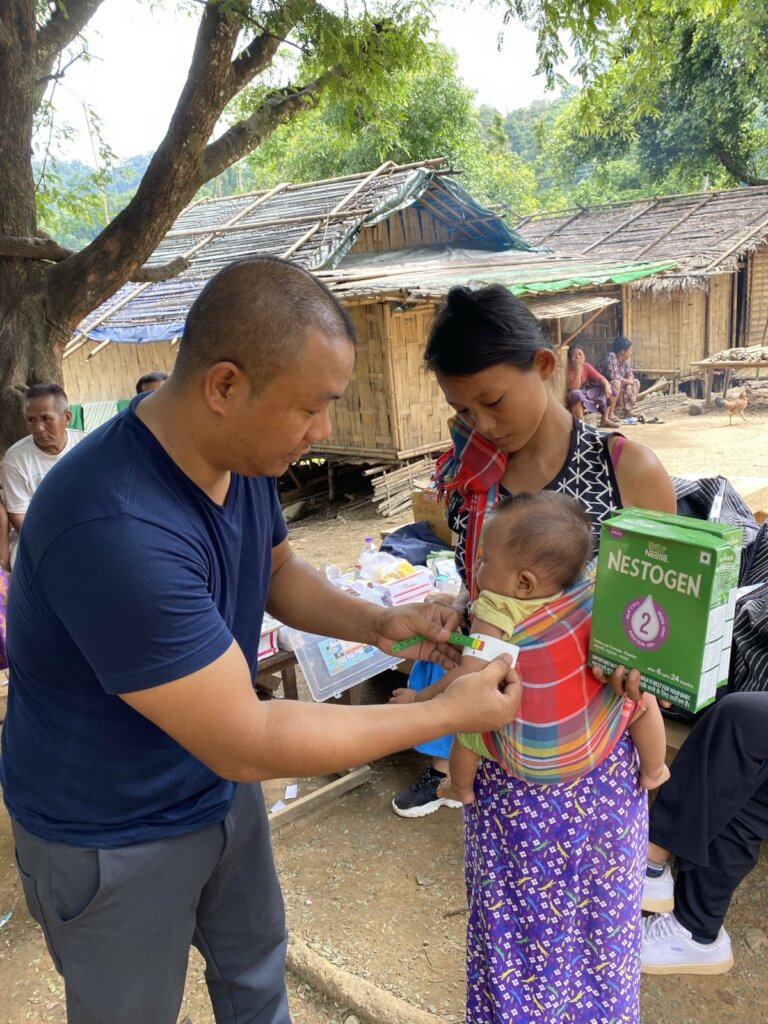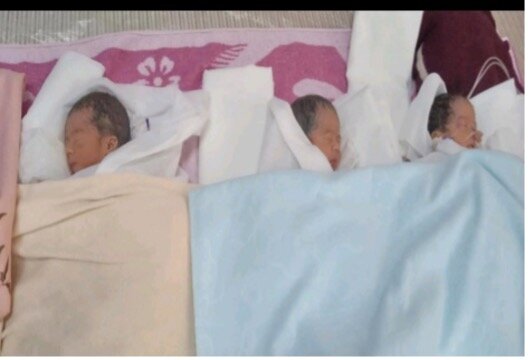By Project Team | Team member
Context update
Myanmar continues to be gripped by a chaotic and brutal civil war. Despite revolutionary forces taking ground in the border areas, conflict is on-going either with the military junta or between various resistance forces. The net effect is that further displacement of communities is taking place, with over 3 million people now having been forced to leave their homes, often multiple times, with a corresponding impact on health, education and poverty levels. The introduction of enforced military conscription by the junta in February 2024 has further compounded the chaos and challenges faced by communities across the country.
Notably, security has deteriorated in the north-west of the country with intensified fighting, increased risk of landmines and restrictions on movement of people and goods[1]. Prices are increasing rapidly, and the military have closed some roads preventing delivery of basic commodities such as rice. During the monsoon, needs escalate rapidly with the need for adequate shelter with heavy rains, landslides and widespread flooding in lowland areas.
Sadly, the situation continues with little reporting from international media. Our Health & Hope team and network of implementing sub-partners continue to work low profile, operating in areas with very poor security and often on-going conflict. Despite this, using local knowledge and connections, they can continue the implementation of a wide range of project activities, which are outlined below.
Health
Community Health and Emergency Response Project
In January 2024 we launched a new project in focusing on strengthening community and primary health care. This is a very exciting opportunity, working with our network of partners in very challenging operational conditions. Here are some key achievements thus far:
Case studies
We highlight a mobile clinic emergency referral of a pregnant 35-year-old mother, Bennu (name changed) who lives in a remote village, 70km away from the nearest town. The referral consultation confirmed a triplet pregnancy that required urgent attention. Bennu was helped with all the necessary medical and transport costs from the fund. She now has healthy triplets. Extra financial support was given for much needed baby milk.
Bennu is thankful, “We give a million thanks to the support from the donors, those who support me with such kind help. Now I and my new triplet babies are happy and healthy with the help of referral support”.
‘I have been serving my community at my best’ - Hayma
Hayma (name changed) is 37 years old, a community health worker. She has 4 children and has been a CHW under the project since April. Hayma was identified by her village leader and selected by her village health committee to be health worker for her village.
“The training was very useful indeed. Knowing the importance of maintaining the right blood pressure and right height and weight alone means a lot to me and my work. So many other things to say but knowing all the basic health information is very helpful at my work and mission.
After weeks of training, I was assigned back at my community with some equipment and medicines. So, I summoned a public meeting during the first week of my return and we all decided how to run my CHW clinic together. Now, after 6 to 7 weeks of service, my community finds it very useful and handy for their emergency health care service. They come in with cuts and wounds, skin issues, diarrhoea and stomach problems and many more. And we give the priority to women with pregnancy and lactation. Their vitamins are fully supplied so they are all very happy with my service.
My very small service is blessed by God that many poor people are being healed free of charge. The project’s service to the community has been really appreciated”.
Mobile health & maternal care
We have been using mobile health technology and mobile clinics to carry out health surveillance and support of pregnant women and infants to improve maternal health outcomes in displaced communities. This project has implemented several mobile clinics, treating several hundred people each time for a variety of primary health care conditions.
Two mobile clinics have been conducted this year (March and July) – reaching seven refugee camps and treating a total of 1,511 patients. Pregnant women have been referred for regular antenatal checks to identify any potential complications and given antenatal care in line with WHO best practice interventions including attended birth by trained personnel and post-natal care.
144 children under 5 years of age were screened for malnutrition; 28% were either moderately or severely malnourished. Referral for treatment and dietary supplements were arranged where needed.
Humanitarian Relief
Myanmar relief projects
Our relief work in Myanmar is continuing, building on the support given in 2023. We have been implementing smaller scale relief projects in through our partners including:
- Multi-purpose cash grants and Explosive Ordnance Risk Education (EORE) delivering support to over 6,500 people. These are distributed to areas which have suffered significant damage due to conflict. Cash grants offer people affected by the on-going crisis the flexibility to choose how to cover their needs in a dignified manner.
- Cash grants and livelihood support - 800 people reached with cash grants and 45 women being trained over the next 12 months in sewing to develop a sustainable livelihood.
Border relief project
The New Dawn project was established to meet the urgent needs presented by the influx of displaced people into remote jungle regions. Since July 2021 we have been working across 20 locations and to date have delivered over 65,000 grants in the form of food, shelter, health, hygiene and medical supplies and livelihood support. In recent months, due to limitations in funding and a desire to transition to more long-term solutions, we have focused on two key areas which reflect the needs articulated by the local leadership committees and beneficiary community:
1) Sustainable food distribution: we now have six food banks supporting over 2,700 refugees. These locally run stores of food provide refugees with basic supplies at a subsidised price, meaning that they are not reliant on handouts and so that we can ensure our supplies are stretched as far as possible. Our team recently carried out a malnutrition survey of children under 5 years and found a not unsurprising correlation between food bank locations and lower rates of malnutrition. It is encouraging that the scheme is working, but a serious reminder also that further food bank sites are desperately needed.
2) Improving access to basic education: over the last year we have enabled over 1,300 children to attend school. We have worked with 20 schools, provided additional furniture and resources, and supported 85 teachers with a stipend to provide education. 85% of children have improved their language skills and over 65% have a reported improvement in overall academic performance. Given the context this is a wonderful achievement.
Education
Freedom to Education programme
In addition to the basic education programme outlined above, our flagship Freedom to Education Programme continues to provide scholarship opportunities to talented young people with a passion to serve their local communities. Recent highlights include:
- Our recent cohort of 21 Year 12 students passed their exams with a 100% success rate, with over 60% passing in the first division. This remarkable result is testament to their hard work and the consistent support given by our team. These young people have been awarded partial scholarships to continue their studies and attend tertiary education in subjects ranging from nursing to business studies to engineering.
- A recent partnership has meant that we have been able to select 35 new students to commence Year 11 courses this year.
- 20 other students are being supported to attend university.
Health & Hope also work together with our local partners to strengthen their capacity across a range of sectors (e.g. organisational management, project management skills and leadership). This also includes providing training and awareness sessions in Prevention of Sexual Exploitation and Abuse, Safeguarding, Gender Based Violence and other cross cutting themes.
Despite the operational and logistical challenges, we remain committed to working with our courageous partners to serve communities facing great need and in the face of such adversity. Without your support this would simply not be possible.
Thank you so much for your ongoing support of our work.
[1] UNHCR Key Displacement figures: Regional Bureau for Asia and Pacific: 3rd July 2024
Project reports on GlobalGiving are posted directly to globalgiving.org by Project Leaders as they are completed, generally every 3-4 months. To protect the integrity of these documents, GlobalGiving does not alter them; therefore you may find some language or formatting issues.
If you donate to this project or have donated to this project, you can receive an email when this project posts a report. You can also subscribe for reports without donating.
Support this important cause by creating a personalized fundraising page.
Start a Fundraiser

